Scenes Dropped By And Or Reshot By Welles
These are scenes which, for whatever reason, were dropped from or reshot for the 131 minute MAGNIFICENTAMBERSONS rough cut.
____________________
The scene is exactly as it was in the script except Mrs. Foster was replaced by Mrs. Johnson.

EXTERIOR – CHURCH – DAY (1890)
The same two matrons and Mrs. Foster are in CLOSEUP in the corner of the frame. In background is the church. As the scene starts, we see the backs of the matrons’ heads, for they are watching Isabel, holding a little boy by the arm walking up the steps of the church. Wilbur and Major Amberson are with her.
THE FIRST MATRON
Looks like Isabel isn’t going to have any more children.
MRS. FOSTER
(turning toward the camera)
Yes, I guess there’s just going to be the one — but I’d like to know if he isn’t spoiled enough for a whole carload.
DISSOLVE:
____________________
This scene precedes Eugene Meeting with Isabel and Wilber Minafer in town. Tandem bicycle riders make fun of Eugene and his steam powered car as they speed past . The scene wasn’t even in the shooting script


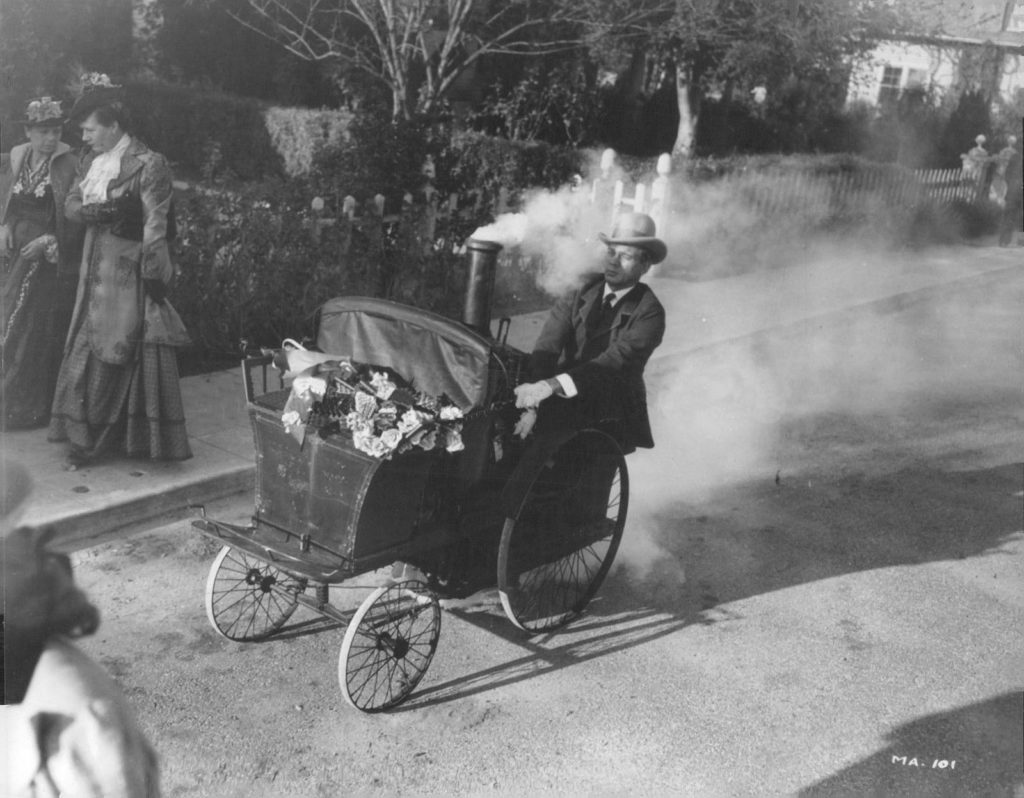
____________________
The scene occurs directly after George has the talk with his Uncle Jack while Jack takes a bath. George walks upstairs to the now deserted ballroom to mull over the situation he now finds himself in regarding his mother, Eugene and his mother’s reputation. Perhaps it proved supercilious or possibly it didn’t work as well as Welles might have wanted. In any case, it was removed.
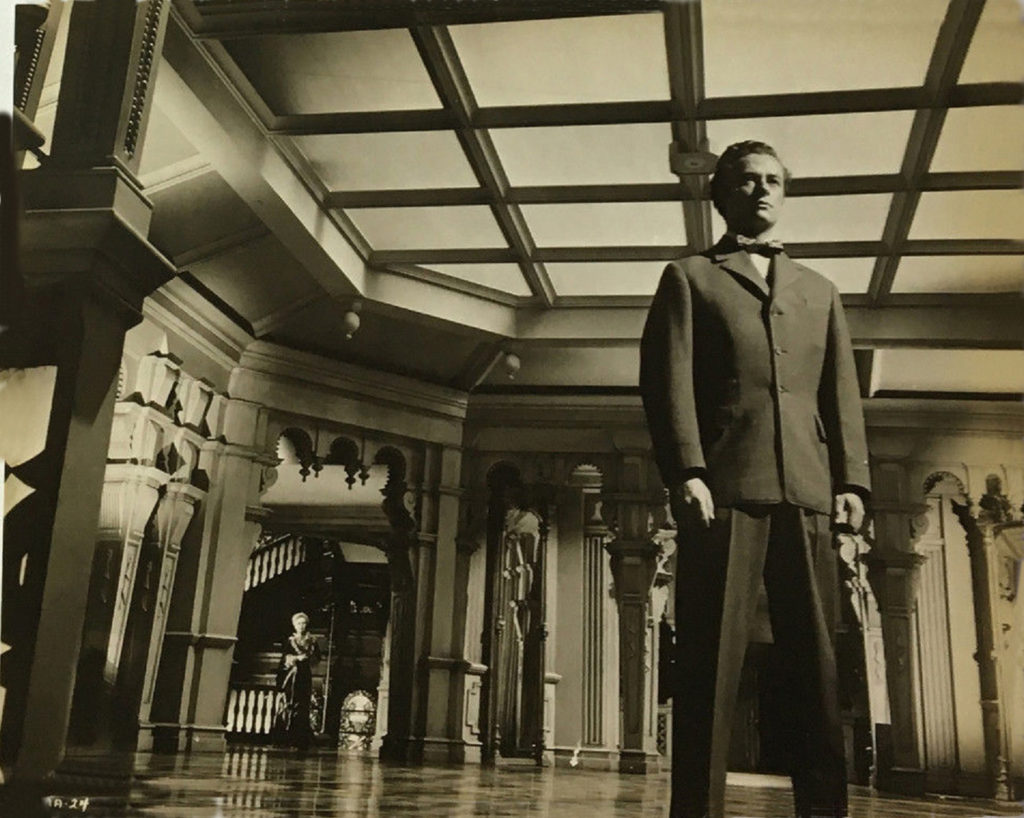
INTERIOR – STAIRCASE AND BALLROOM – AMBERSON MANSION – MOONLIGHT – (1905) Moonlight, coming through the glass ceiling, floods the room. George walks to the center of the ballroom and stands there, reflected in the pier glass mirrors that line all sides of the room. Then he hears a quick footfall, and Isabel’s voice again.
ISABEL
Georgie — is that you?
Isabel is heard coming up the stairs. George has nowhere to retreat, so he just stands there. Isabel stops on the stairs, seeing his lonely figure standing in the ballroom.
ISABEL
I’ve been wondering where you were, dear.
GEORGE
Had you?
Silence.
ISABEL (timidly)
Wherever it was, I hope you had a pleasant evening.
Silence.
GEORGE (without expression)
Thank you.
ISABEL
You wouldn’t care to be kissed good night, I suppose? (with a little flurry of placative laughter) At your age, of course!
Silence, blanker than those which had preceded.
ISABEL (her voice blank, too)
Good night.
She goes down the stairs.
FADE OUT:
____________________
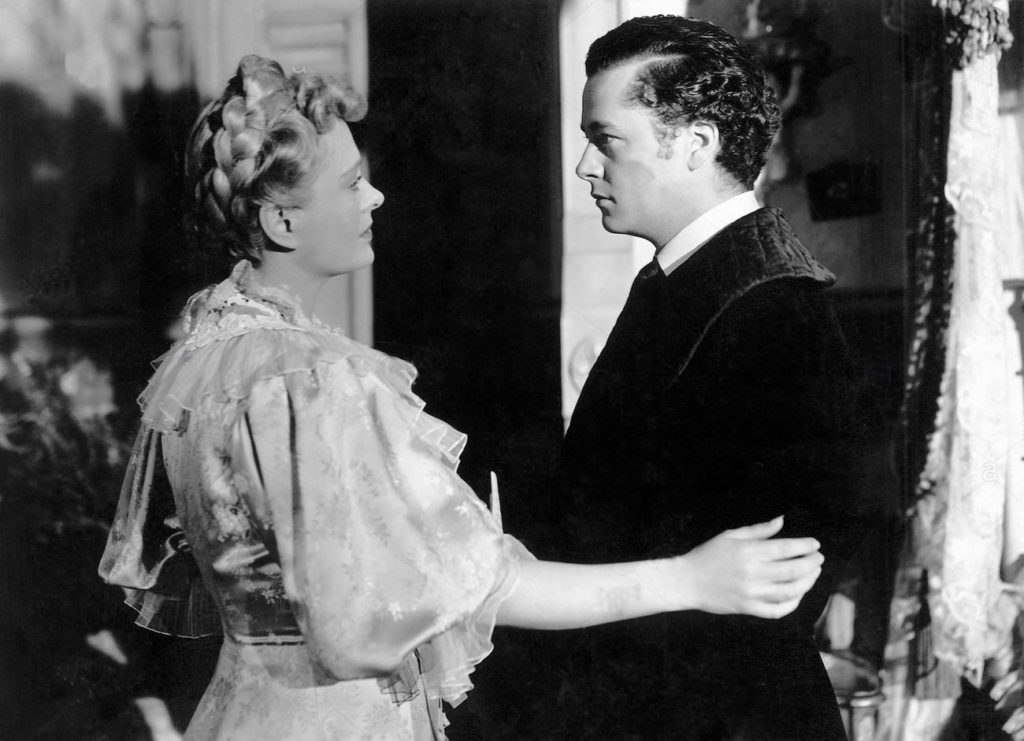
This is the the scene in which George and Isabel discuss Eugene’s letter. In the script it takes place in George’s bedroom but Welles transposed it to Isabel’s. It was entirely re-shot by Welles for the rough cut. In the original scene George is wearing a long black dressing gown because of a Hamlet reference later in the scene .
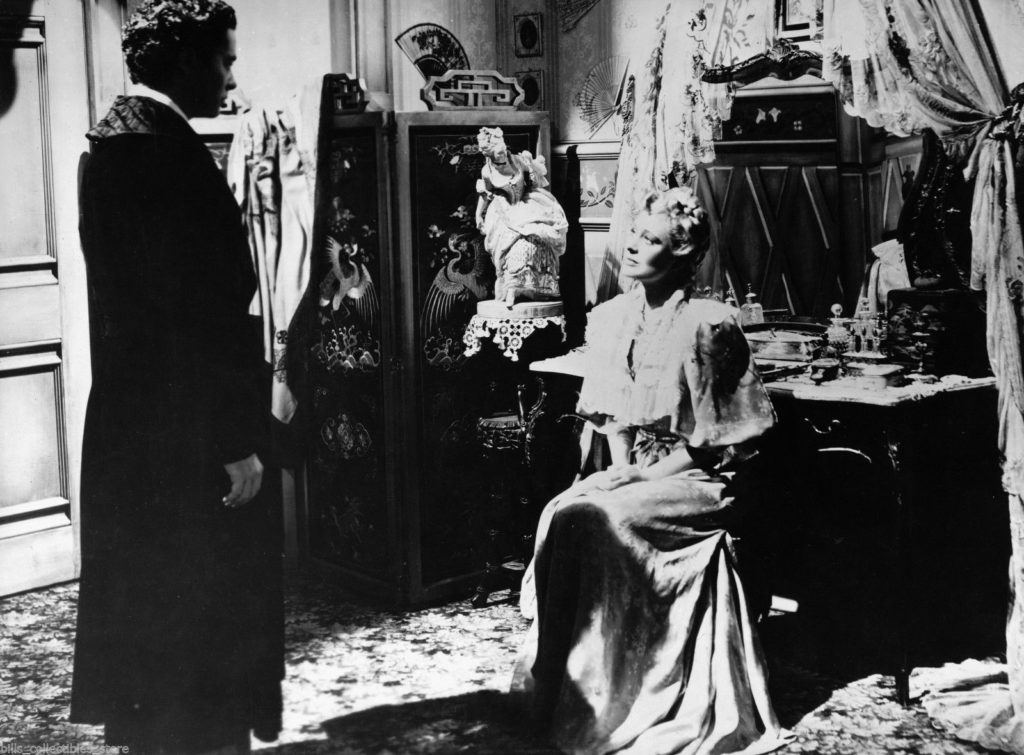
INTERIOR – GEORGE’S BEDROOM – AMBERSON MANSION – NIGHT -(1905) George, wearing his long black velvet dressing gown, has just finished reading Eugene’s letter. Isabel is standing at the other end of the room, her back to him, her head drooping a little. George tosses the letter abruptly from him so that one sheet falls upon his bed and the others upon the floor. At the faint noise of their falling, Isabel comes and, kneeling, begins to gather them up.
ISABEL
Did you read it, dear?
GEORGE
Yes, I did.
ISABEL (gently, as she rises)
All of it?
GEORGE
Certainly! It’s simply the most offensive piece of writing that I’ve ever held in my hands!
Isabel steps back from him, startled.
ISABEL
But, dear, I thought–
GEORGE
I can’t understand your even showing me such a thing! How did you happen to bring it to me?
ISABEL
Your uncle thought I’d better. He thought it was the simplest thing to do, and he said that he’d suggested it to Eugene, and Eugene had agreed. They thought–
GEORGE (bitterly)
Yes, I should like to hear what they thought!
ISABEL
They thought it would be the most straightforward thing.
GEORGE (draws a long breath)
Well, what do you think mother?
ISABEL
I thought it would be the simplest and most straightforward thing; I thought they were right.
GEORGE
Very well! We’ll agree it was simple and straightforward. Now what do you think of that letter itself?
ISABEL (hesitates looking away)
I — of course I don’t agree with him in the way he speaks of you, dear –
GEORGE (breaking in)
Don’t you think this was a pretty insulting letter for that man to be asking you to hand your son?
ISABEL
Oh, no! You can see how fair he means to be.
GEORGE
Do you suppose it over occurs to him that I’m doing my simple duty? That I’m doing what my father would do if he were alive? That I’m doing what my father would ask me to do if he could speak from his grave out yonder? Do you suppose it ever occurs to that man for one minute that I’m protecting my mother?

He raises his voice, advancing upon Isabel fiercely. Isabel bends her head before him.
GEORGE
He’s got my mother’s name bandied up and down the streets of this town till I can’t step in those streets without wondering what every soul I meet is thinking of me and of my family, and now he wants you to marry him so that every gossip in town will say, “There! What did I tell you? I guess that proves it’s true! He said he and you don’t care what they say, but I know better! He may not care — probably he’s that kind — but you do. Is it fair of him to want you to throw away your good name just to please him? That’s all he asks of you — and to quit being my mother! You’re my mother and you’re an Amberson — and I believe you’re too proud! You’re too proud to care for a man who could write such a letter as that! (he stops, faces her, and speaks with more self-control) Well, what are you going to do about it, Mother?
Her head droops.
GEORGE (demanding, like a judge on a bench)
What answer are you going to make to such a letter?
ISABEL (murmurs)
I — I don’t quite know, dear.
GEORGE
Do you think if you did what he wants you to I could bear to stay another day in this town, Mother? Do you think I could ever bear even to see you again if you married him? I’d want to, but you surely know I just-couldn’t!
Isabel makes a futile gesture, and seems to breathe with difficulty.
ISABEL (faltering)
I — I wasn’t — quite sure about — about it’s being wise for us to be married — even before knowing how you feel about it. I wasn’t even sure it was quite fair to — to Eugene. I have — I seem to have that family trouble like father’s — that I spoke to you about once. (she manages a deprecatory little dry laugh) Not that it amounts to much, but I wasn’t at a11 sure that it would be fair to him. Marrying doesn’t mean so much, after all - not at my age. It’s enough to know that — that people think of you — and to see them. I thought we were all — oh, pretty happy the way things were, and I don’t think it would moan giving up a great deal for him or me, either, if we just went on as we have been. I—I see him almost every day and-
GEORGE (loudly and sternly)
Mother! Do you think you could go on seeing him after this!
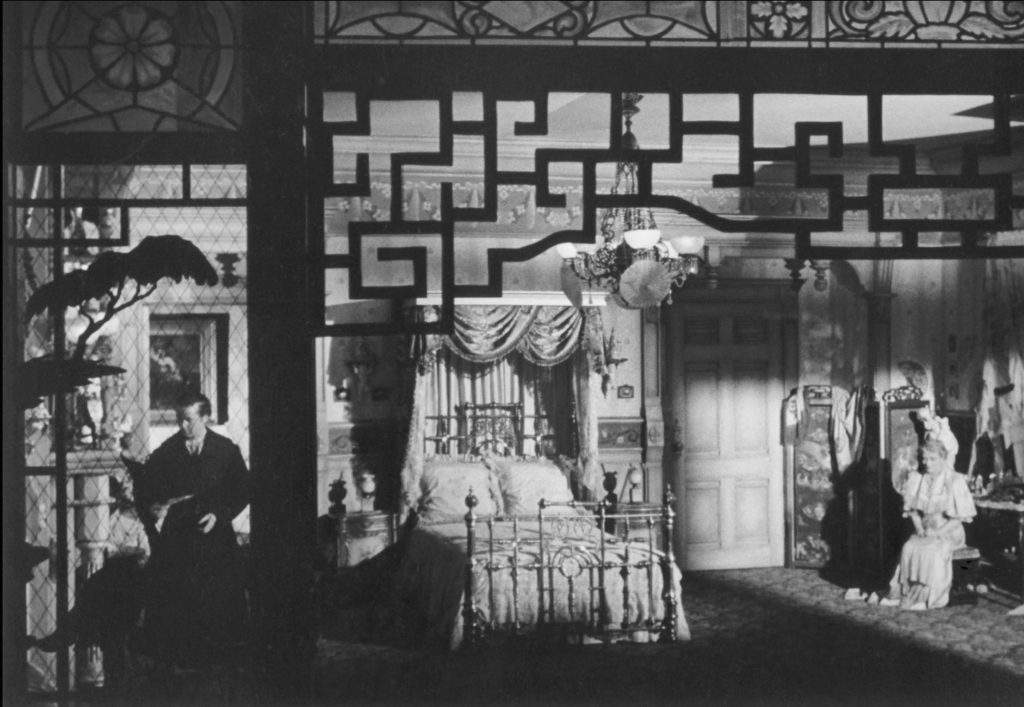
Isabel had been talking helplessly before — her tone is a little more broken now.
ISABEL
Not — not even — see him?
GEORGE ·
How could you? Mother, it seems to me that if he ever set foot in this house again – oh! I can’t speak of it! Could you see him, knowing what talk it makes every time he turns into this street, and knowing what that means to me! Oh, I don’t understand all this — I don’t! If you’d told me, a year ago, that such things were going to happen, I’d have thought you were insane — and now I believe I am!
His anguish is none the less real for its vehemence; and the stricken Isabel comes to him instantly and bends over him, once more enfolding him in her arms. She says nothing but suddenly her tears fall upon his head. She sees them and seems to be startled.
ISABEL
Oh, this won’t do! I’ve never let you see me cry before, except when your father died. I mustn’t!
She runs from the room. A little while after she has gone, George rises and, happening to catch sight in his pier glass of the picturesque and medieval figure thus presented in his dressing gown, he pauses to regard it; something profoundly theatrical in his nature comes to the surface· His lips move.
GEORGE (half-aloud, whispering)
Tis not a lone my inky cloak, good Mother, Nor customary suits of solemn black. . .
His own mirrored princely imago with hair disheveled on the white brow, the long tragic fall of black velvet from the shoulders, reminds him of that other gentle prince and heir whose widowed mother was minded to marry again.
GEORGE
“But I have that within which passoth show; These but the trappings and the suits of Woe.” He looks and feels like Hamlet.
DISSOLVE OUT:
____________________
Originally Isabel’s letter to George was read over Isabel writing it. In the 131 minute version it is now read by Isabel as George is reading it in his bedroom.
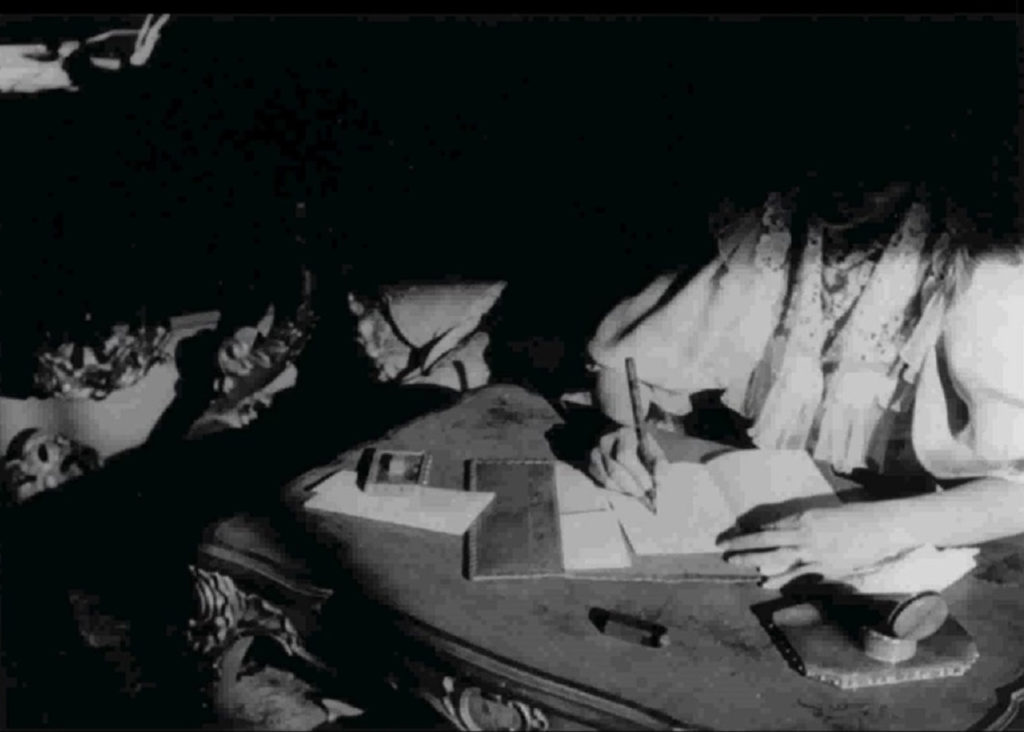
INTERIOR – ISABEL’S ROOM – AMBERSON MANSION – NIGHT (1905) CLOSE SHOT of Isabel at her writing table. The scratching of her pen is heard and over it on sound track, her voice speaks the words she is writing, but her lips do not move.
ISABEL’S VOICE (on sound track)
George, my own dearest boy - I think it is a little better for me to write to you, like this, instead of waiting till you wake up and then telling you, because I’m foolish and might cry again, and I took a vow once, long ago, that you should never see me cry. Not that I’ll feel like crying when we talk things over tomorrow. I’ll be all right and fine”(as you say so often) by that time –- don’t fear. I think what makes me most ready to cry now is the thought of the terrible suffering in your poor face, and the unhappy knowledge that it is I, your mother, who put it there. It shall never come again. I’ve written Eugene just about what I think you would like me to — though I told him I would always be fond of him and always his best friend, and I hoped his dearest friend. He’ll understand about not seeing him. He’ll understand that though I didn’t say it in so many words. You mustn’t trouble about that — he’ll understand. Good night, my darling, my beloved, my beloved! You mustn’t be troubled. I think I shouldn’t mind anything very much so long as I have you “all to myself” — as people say — to make up for your long years away from me at college. We’ll talk of what’s best to do in the morning, shan’t we? And for all this pain you’ll forgive your loving and devoted—
____________________
This still is from the famous Stanley Cortez single-take shot of the camera roving about the now empty Amberson mansion to which George returned after seeing off Uncle Jack at the train station. It was obviously filmed to show the Amberson Manson in a state of decay as counterpoint to the grand home it had once been years earlier at the great ball. I have no idea why Welles eliminated it although he did say in an interview that he had tried “first person as camera” in Ambersons but didn’t think it worked very well and that may be why he cut it. (Although he used it successfully in the Mrs. Johnson confrontation, the walk back home and Eugene in front of the mirror during the Boarding House scene.) Many writers have incorrectly speculated that this scene was included in the 131 cut and was taken out by RKO. It wasn’t. Welles had instructed Wise to remove it before the 131 minute rough cut/preview print was prepared.

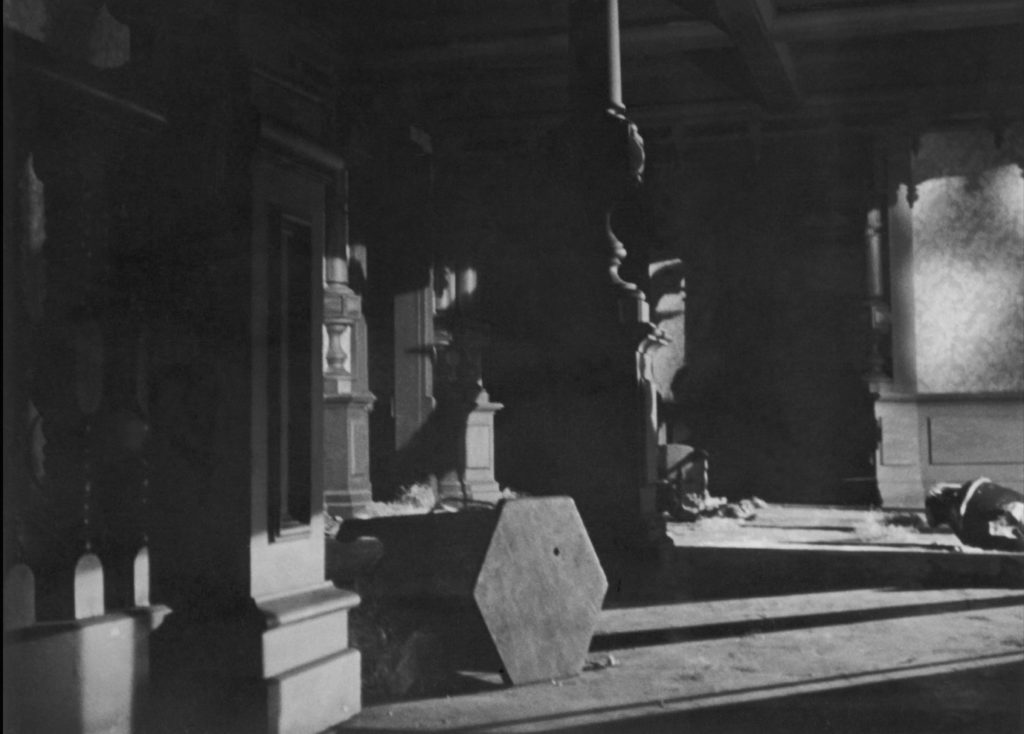
MOVING SHOT as CAMERA WANDERS SLOWLY about the dismantled house — past the bare reception room; the dining room which contains only a kitchen table and two kitchen chairs; up the stairs, close to the smooth walnut railing of the balustrade, here CAMERA STOPS for a moment, then PANS down to the heavy doors which mask the dark, empty library, HOLD on this for a short pause, then CAMERA PANS back and CONTINUES, even more slowly, up the stairs to the second floor hall where it MOVES up to the closed door of Isabel’s room. The door swings open and we see Isabel’s room is still as it always has been; nothing has been changed.
FADE OUT
